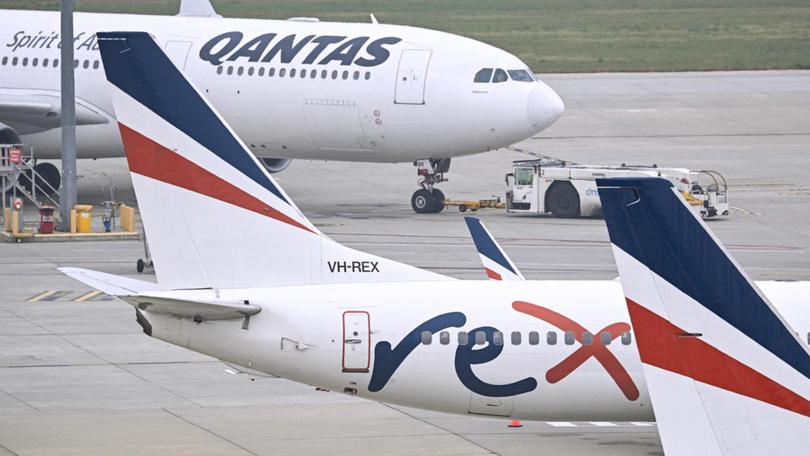Competition watchdog finds domestic airfares soared after Rex Airlines collapse
Australian travellers have been paying up to a whopping 95 per cent more for major domestic flights since Rex Airlines’ collapse, the consumer regulator has revealed.

Australian travellers have been paying up to a whopping 95 per cent more for major domestic flights since Rex Airlines’ collapse, the consumer regulator has revealed.
The Sydney-based airline in July appointed administrators and grounded its fleet that provided services between major cities, leaving customers with fewer options for lower-cost carriers.
A new Australian Competition and Consumer Commission report on Tuesday has now revealed just how much more travellers have been forking out since Rex axed its 11 routes to major national airports.
Sign up to The Nightly's newsletters.
Get the first look at the digital newspaper, curated daily stories and breaking headlines delivered to your inbox.
By continuing you agree to our Terms and Privacy Policy.The most notable spikes were recorded on routes from Adelaide to Melbourne (up 95 per cent to $296), Melbourne to the Gold Coast (up 70 per cent to $432) and Canberra to Melbourne (up 54 per cent to $298).
Prices for other less-travelled routes like Canberra-Gold Coast soared 171 per cent $490 and Brisbane-Hamilton Island up 122 per cent to $871.
Rex axed domestic flights between Perth and other major cities, but is still fulfilling its State Government-regulated regional routes servicing Carnarvon, Monkey Mia, Albany and Esperance.
The ACCC on Tuesday said since Rex’s collapse, the average airfare on all major city routes jumped by 13.3 per cent to September.
“The withdrawal of Rex from major city routes has meant passengers no longer have the lower cost options it provided,” the report said.
“The increase coincides with less competition after Rex’s exit from many of these routes, an increase in seasonal demand during September and fuller flights.”
ACCC commissioner Anna Brakey said the exit of Rex as a third competing airline group on services between metropolitan cities may have significant longer-term impacts on the domestic aviation sector.
“With less competition, there is less choice for consumers and less incentive for airlines to offer cheaper airfares and more reliable services,” she said.
The ACCC said there was no domestic route serviced by more than two major airline groups, with Qantas and Virgin Australia servicing 98 per cent of domestic passengers.
Qantas said the ACCC report “does not reflect” the prices paid by customers and factors impact demand and fares.
“The data is from the Government’s monthly fare monitoring which expressly states that it does not measure ‘average fares paid by passengers,” Qantas domestic chief executive Markus Svensson said.
“The day selected in the latest report was 31 October, which is when Melbourne was hosting Coldplay.
“As such, demand was significantly higher on flights into Melbourne which means lower fares were snapped up early and the fares left available to purchase three weeks out were higher than usual.”
It comes the same day the Federal Government announced it would provide Rex up to $80 million to keep its regional routes running and grant early access to entitlements for the airline’s former employees.
In a joint statement, Transport Minister Catherine King and Workplace Minister Murray Watt said the funding would support the continuation of critical services for regional communities.

